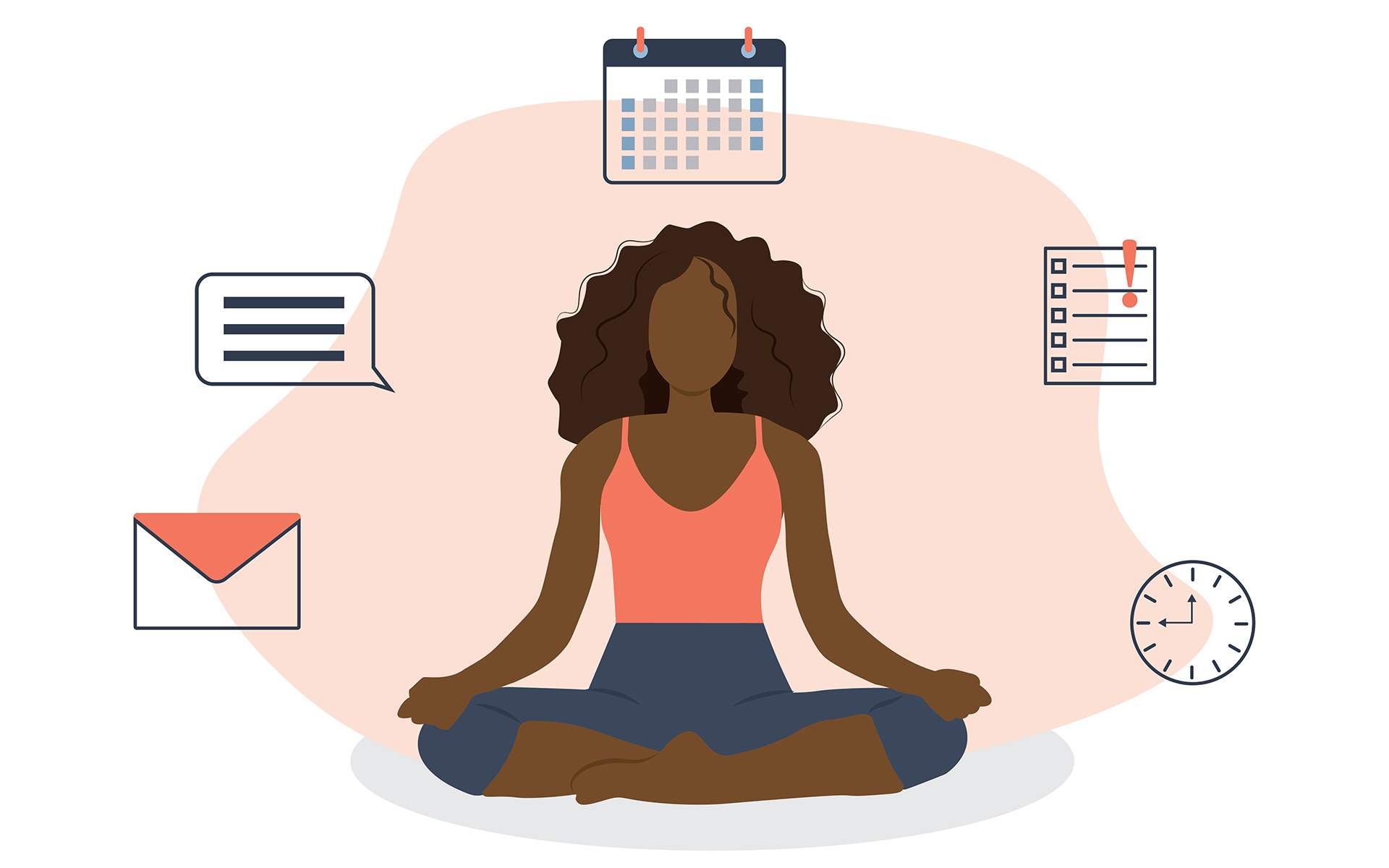If you find yourself struggling to start or keep up a meditation practice, you’re not alone. Although meditation instructions are usually simple (for example, to maintain a gentle focus on the breath), that doesn’t mean meditating itself is always easy. Research suggests that new and experienced meditators alike face barriers to practice.
For instance, a study I published with colleagues in 2020 found that new meditators often question whether meditation will in fact be beneficial, doubt whether they’re meditating correctly, struggle to find space and time for practice, and sense that meditation conflicts with their cultural or familial norms. After people complete a formal meditation course, their meditation frequency drops; even experienced meditators describe how hard it is to face difficult feelings that can arise in meditation, like anxiety.
As a meditation researcher and practitioner myself, I admit that it can be tough to keep up the habit each and every day. Yet, amid the coronavirus pandemic, systemic oppression, the climate emergency, and the frenetic pace of the workplace, we may need the practice now more than ever.
A “Right” Way to Build a Meditation Practice?
The importance of daily meditation practice has been a subject of some debate among researchers in recent years. Does it matter if people meditate at home on a regular basis, or is it enough to take a teacher-led course without integrating formal meditation into daily life?
Researchers have tended to study this issue by asking people taking a formal meditation course, like Jon Kabat-Zinn’s Mindfulness-Based Stress Reduction program, to record how much they meditate outside of class on a daily or weekly basis. They then add up how much each person practiced and look to see if people who meditate more at home benefit more from the course than those who practice less.
Although multiple studies suggest that more practice means more benefits, others report that it doesn’t matter how much people meditate—they’ll improve about the same amount, in terms of clinical outcomes such as symptoms of depression and anxiety. What could that mean? These inconsistent findings signal that meditation practice in daily life could be beneficial, and that factors other than how long we practice can make a difference.
For instance, the quality of practice could be equally or more important. Also, there are many benefits that come from taking part in any class or program designed to support well-being, whether or not it emphasizes mindfulness. For instance, the sense of belonging we get through interacting with fellow participants and teachers can be healing in its own right.
The Perks of Daily Meditation Practice
Another possibility is that the method of totaling the time people spend meditating and seeing if that predicts improved well-being over weeks or months doesn’t show us the more nuanced, day-to-day picture. Will we tend to feel better on days when we meditate, versus on days when we don’t?
A new study sheds light on this issue, suggesting that daily practice is necessary to benefit, at least among new meditators. Researchers asked 82 adults participating in a 21-day mindfulness meditation course to report how often and for how long they practiced meditation each day. Participants also rated various thoughts and feelings expected to be improved by meditation, like mindful awareness and positive emotions, multiple times per day via their smartphones.
Will we tend to feel better on days when we meditate, versus on days when we don’t?
This approach, termed intensive experience sampling, is innovative in that it allows researchers to understand people’s behaviors and experiences as they unfold in their real lives, as opposed to asking people to remember what they felt and did over a period of weeks (our memory often fails us here).
The researchers found that people experienced more positive emotions and mindful awareness during the hours following meditation practice sessions, and that longer sessions produced even better same-day outcomes. This suggests that daily practice matters. Interestingly, they also observed that meditation practice effects did not accumulate over the 21-day period, or carry over to the next day. Taken together, these results indicate that new meditators need to practice every day in order to benefit, and may reap even greater same-day benefits the longer they practice.
4 Science-Backed Tips to Help You Meditate Every Day
Here, we come back to the problem of starting the practice and actually sticking with it over time. Although researchers are actively seeking to understand how to help people make meditation a habit, here are a few evidence-based tips that you might try to integrate meditation into your life.
- Try meditating in a group, either in-person or virtually. When it comes to health behaviors, research consistently shows that social support and watching other people do what we want to do helps us integrate it into our own lives. Although it’s tempting to practice in isolation using the variety of smartphone applications and readily available online resources on meditation (and doing so can be very helpful), the energy of a group can be sustaining. Look for meditation groups at local meditation or counseling centers, or start your own.
- Each time you practice, pause and remind yourself why you’re meditating. Is it to live life more fully, be less emotionally reactive, or offer more compassion to others? Research indicates that our behavioral intentions partially drive our actions. If we forget why we intended to do something, it’s easier to start feeling like the behavior is meaningless, and to be thrown off course. Let your deepest intentions guide you.
- Reflect on the science-backed benefits of meditation. When we believe that a behavior will benefit us, we’re more likely to do it. Research suggests that meditation can increase positive emotions, reduce anxiety, improve well-being, and even prevent headaches. The benefits may even extend beyond ourselves to our interpersonal relationships and communities, through helping us be more forgiving and compassionate toward others.
- Nurture positive emotions. Findings from a recent study suggest that people who tend to experience more positive feelings in daily life are more likely to start and keep up a meditation practice. Another study reported that new meditators who experienced more positive emotions during their first few meditation sessions were more likely to continue the practice over time. When you meditate, try to notice any positive feelings, sense of meaning, or other benefits that emerge during and following your sessions. More generally, try to schedule pleasant activities during your day, and intentionally notice positive feelings that may arise. Consider trying this savoring practice to boost your tendency to experience positive feelings in daily life.
Be kind to yourself if you stray from your meditation goals. Criticizing ourselves after we fail to behave in ways we’d like actually undermines our ability to change. Appreciate the time you have devoted to your practice, as well as your desire to increase your and others’ well-being through meditation. If you find yourself particularly caught in self-judgment, consider practicing this self-compassion exercise or loving-kindness meditation. Above all, recognize that each moment presents an opportunity to start again.
This article originally appeared on Greater Good, the online magazine of UC Berkeley’s Greater Good Science Center, one of Mindful’s partners. View the original article.







